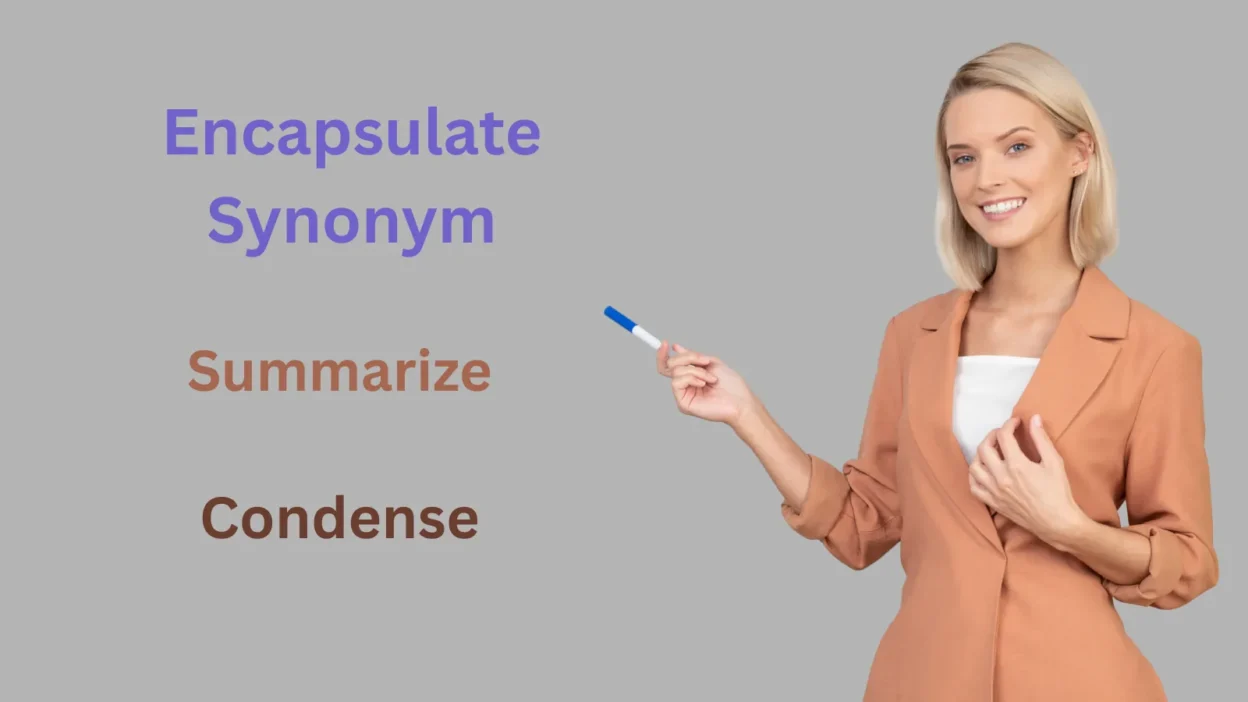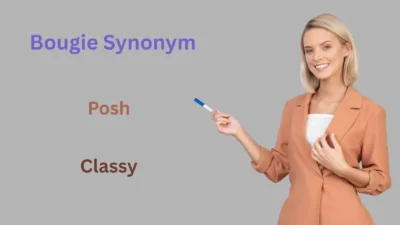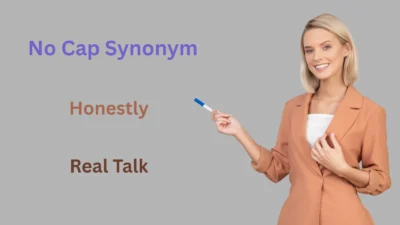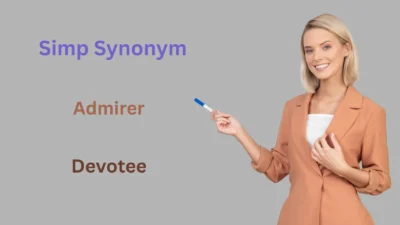Encapsulate Synonym words like summarize, condense, and express describe the act of capturing the main idea or essence of something in a concise form. For example, you might say, “The title perfectly encapsulates the story’s theme,” or “Her speech encapsulated the spirit of teamwork.” Each synonym shows a slightly different shade of how we present, compress, or express complex ideas simply.
If you’re writing about communication, explanation, or creative expression, using the right synonym for encapsulate makes your message more polished, precise, and impactful.
In this guide, you’ll explore powerful encapsulate synonyms with their meanings, examples, and usage tips to help you choose the perfect word for any context—from academic writing to storytelling.
Understanding the Word “Encapsulate”
The word “encapsulate” means to express the essential features of something succinctly or to enclose something tightly. It’s often used when summarizing ideas, representing complex thoughts briefly, or enclosing content in a compact form.
For example:
- This paragraph encapsulates the main theme of the novel.
- The capsule encapsulated the medicine securely.
Because encapsulate blends both expression and containment, its synonyms vary depending on whether you’re describing communication, summary, or structure.
30 Synonyms of “Encapsulate” with Meanings, Examples, and Usage Tips
1. Summarize
Meaning: To state the main points briefly.
Example: The report summarizes last year’s performance.
When to Use: Best for academic, professional, or analytical writing.
2. Condense
Meaning: To make something shorter or more compact.
Example: He condensed the lecture into three key points.
When to Use: When reducing size or volume without losing meaning.
3. Express
Meaning: To convey an idea or feeling effectively.
Example: Her artwork expresses deep emotion.
When to Use: For creative or emotional communication.
4. Convey
Meaning: To communicate or transfer meaning.
Example: The ad conveys a message of unity.
When to Use: Ideal for communication or marketing contexts.
5. Capture
Meaning: To represent something precisely or vividly.
Example: The movie captured the essence of the novel.
When to Use: For artistic or descriptive writing.
6. Enclose
Meaning: To surround or contain something.
Example: The capsule enclosed the powder inside.
When to Use: Physical or literal containment contexts.
7. Summate
Meaning: To sum up or totalize.
Example: The conclusion summates the core findings.
When to Use: Academic or research writing.
8. Represent
Meaning: To stand for or symbolize.
Example: The flag represents national unity.
When to Use: For symbolic or formal descriptions.
9. Mirror
Meaning: To reflect something accurately.
Example: Her tone mirrored his frustration.
When to Use: Emotional or reflective contexts.
10. Portray
Meaning: To depict or describe vividly.
Example: The novel portrays life in the 19th century.
When to Use: Literary or artistic descriptions.
11. Embody
Meaning: To give tangible form to an idea or quality.
Example: He embodies the spirit of resilience.
When to Use: For abstract concepts or traits personified.
12. Enclose Within
Meaning: To hold or keep something inside another.
Example: The box enclosed within it a secret letter.
When to Use: Literal or metaphorical containment.
13. Reflect
Meaning: To show or be a sign of something.
Example: His words reflect his sincerity.
When to Use: For insight or emotional expression.
14. Depict
Meaning: To show or illustrate in detail.
Example: The painting depicts a calm seaside village.
When to Use: Visual, narrative, or artistic writing.
15. Illustrate
Meaning: To make something clear with examples or visuals.
Example: This graph illustrates the results perfectly.
When to Use: Academic, explanatory, or presentation contexts.
16. Outline
Meaning: To give a general description or plan.
Example: She outlined the project goals in her speech.
When to Use: For structured, professional summaries.
17. Sum Up
Meaning: To briefly describe the essence.
Example: That quote sums up the entire message.
When to Use: Informal or concise communication.
18. Distill
Meaning: To extract the essential meaning.
Example: The author distilled years of experience into one chapter.
When to Use: For refining or condensing ideas or emotions.
19. Capture the Essence
Meaning: To express the main quality or meaning.
Example: The poem captures the essence of nostalgia.
When to Use: Poetic or emotional writing.
20. Embellish
Meaning: To enhance or decorate an idea.
Example: He embellished the story with vivid details.
When to Use: Creative writing or storytelling.
21. Enshrine
Meaning: To preserve or protect something cherished.
Example: The constitution enshrines the rights of citizens.
When to Use: Legal, cultural, or sacred contexts.
22. Encircle
Meaning: To surround completely.
Example: The wall encircled the ancient city.
When to Use: Literal or metaphorical enclosure.
23. Imbue
Meaning: To inspire or fill with a quality or emotion.
Example: Her speech was imbued with hope.
When to Use: Poetic or emotional communication.
24. Exemplify
Meaning: To show or demonstrate clearly.
Example: This chapter exemplifies her writing style.
When to Use: Academic or explanatory contexts.
25. Personify
Meaning: To represent a quality through a person or thing.
Example: He personified courage in every act.
When to Use: Figurative, literary, or emotional tone.
26. Incorporate
Meaning: To include or combine within something larger.
Example: The plan incorporates new sustainability goals.
When to Use: Business, technical, or policy writing.
27. Include
Meaning: To contain as part of a whole.
Example: The package includes all essential tools.
When to Use: Everyday or instructional writing.
28. Compress
Meaning: To press or squeeze into a smaller form.
Example: He compressed the entire lecture into a short note.
When to Use: For literal or abstract shortening.
29. Encompass
Meaning: To include or cover completely.
Example: The book encompasses every aspect of design.
When to Use: Broad, formal, or academic tone.
30. Capture in Brief
Meaning: To describe something concisely.
Example: Her summary captured in brief the core argument.
When to Use: Clear, professional, or academic summaries.
Choosing the Right Synonym for “Encapsulate”
Selecting the right synonym depends on what you want to emphasize:
- For Academic Writing: summarize, condense, distill, outline
- For Creative Expression: portray, capture, embody, personify
- For Emotional Tone: imbue, reflect, express, mirror
- For Formal/Legal Contexts: enshrine, incorporate, encompass
- For Everyday Clarity: sum up, convey, represent, include
Cultural Tip:
In American English, summarize and condense are the most common for academic or business writing. In British English, sum up and encapsulate are preferred in both professional and casual contexts for brevity and elegance.
Conclusion :
Encapsulate Synonym words help you express ideas clearly, powerfully, and concisely. Whether you want to summarize information, convey emotions, or capture the essence of something, choosing the right synonym shapes how your message is understood.
By mastering these alternatives, your writing becomes more precise, expressive, and professional—able to encapsulate meaning in ways that truly connect with your audience.





